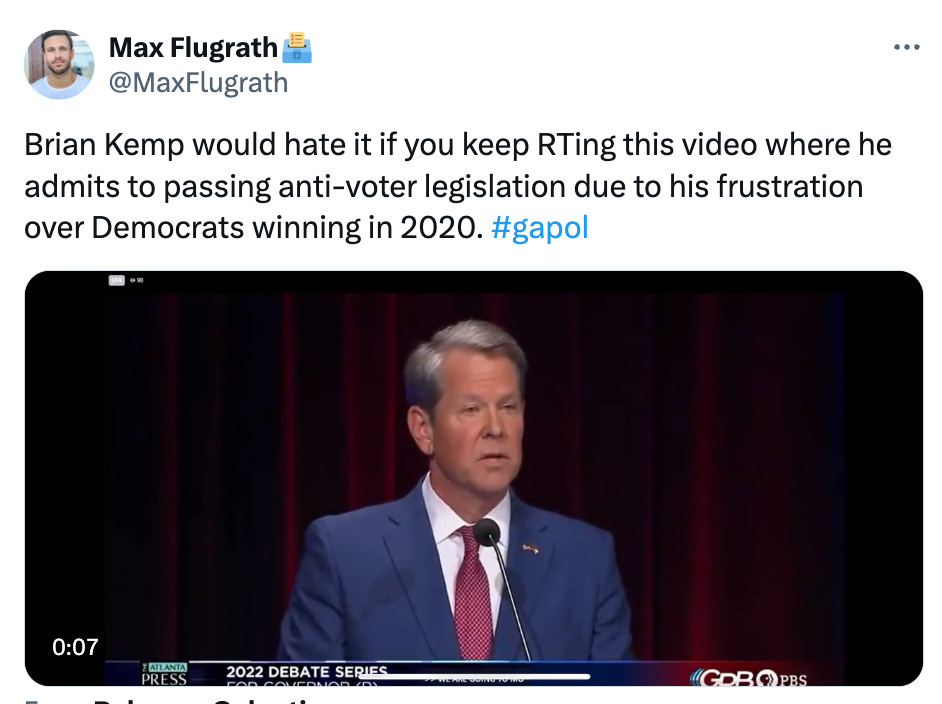By now, you’ve probably seen the reporting about Georgia, where a pro-MAGA majority on an unelected board appointed by partisans is making it systematically more difficult for “people” to vote. Voter suppression is nothing new in the South. But anti-voting activity is ramping up in Georgia because the state that delivered its 16 electoral votes to Joe Biden in 2020 along with two senators to create the Democratic majority in the Senate is firmly in play in 2024.
The Democratic Convention has been exhilarating so far, but we shouldn’t lose sight of the hard work ahead.
In my experience, two things happen simultaneously in the South and, increasingly, in other parts of the country in connection with elections:
Republicans complain about voter fraud. It used to be claims of dead people voting or of “people” voting more than once, with a focus on minority communities. Now it’s “illegal aliens” and felons voting or incorrect complaints about students and others they claim aren’t residents. There is little evidence to support it. During the eight years of the George W. Bush administration, federal prosecutors were unable to dredge up significant voter fraud cases. And during the Trump administration, when Jeff Sessions demanded them, a North Carolina U.S. Attorney responded with around a dozen prosecutions, many of which were dismissed or pled down to misdemeanors after it came to light voters had been advised they could vote. (By comparison, Trump’s former Chief of Staff Mark Meadows, who appears to use the address of a rental property he never lived in as his registration address, was never charged).
Republicans try to keep people who are entitled to vote from voting. Voter suppression used to take the form of so-called intelligence tests—asking impossible questions like how many jelly beans were in a jar—required only of Black voters or poll taxes. Today, there are identification laws that make it difficult for poor or elderly people to vote, fewer polling places, long lines, limited days to vote, and last-minute changes to the rules. Some states make it difficult to comply with rules for mail-in and Absentee balloting.
If you’re talking with an eligible voter who doesn’t plan on casting a ballot because “my vote doesn’t count,” remind them political operatives wouldn’t be going to so much trouble to make it difficult for them to vote if their vote didn’t matter.
That takes us to what’s going on in Georgia. Things have gotten so bad with efforts to make voting more difficult for qualified voters, ones living in areas that are perceived as leaning Democratic, that a former chair of the Georgia State Election Board filed an ethics complaint against three Trump-allied members. He alleges that they “knowingly and willfully violated state law” and are trying to “advance their own political preferences” with changes to Georgia’s election rules. Apparently, Donald Trump agrees. He gave the three a shout-out at his rally in Atlanta, saying that each of them, by name, was doing a great job and calling them “pit bulls fighting for honesty, transparency and victory.”
The most significant rules change the three board members—each of whom questioned the results of the 2020 election—have slipped in just ahead of this year’s election is one that allows local election officials to delay or deny certification if they have concerns about the outcome. No standard for judging whether those concerns are valid was established.
As we’ve discussed previously, this is contrary to long-standing rules in Georgia. The duty of these officials to certify election results is “ministerial”—a task they are required to do. They lack discretion to question the vote counts. You don’t have to be an expert in election law to see what’s happening: Trump is trying to create a legal path to do what he failed to accomplish in 2020, overturning the will of the voters if he loses. He is all but saying he will challenge the results, just like he did in both 2016 and 2020 when he refused to say he would honor the outcome of the election if he lost. He is doing it again. If you think this is going to be an easy election because of the glamour of the convention this week, please think again. It will be a hard-fought battle, and Trump will not concede if he loses. The only real questions are how far he will go and who or what will stop him.
It’s not just a recent invention. Voter suppression is always in fashion for Republicans. After Trump lost Georgia in 2020, GOP state legislators passed measures that made it more difficult to vote. Georgia Governor Brian Kemp signed the package, SB 202, into law. During a primary debate when he was running for re-election in 2022, Kemp acknowledged that he had been “frustrated” that Democrats won in 2020 and “did something about it with SB 202.”
Voter suppression is an ongoing work in progress, and it requires Democrats—and really anyone who believes all eligible Americans should be able to vote—to be vigilant.
With election day six months out, Governor Kemp signed another new anti-voter bill, SB 189. That law gives MAGA activists an easy path for challenging other Georgians’ right to vote without any official proceedings. The AP reported that “They’re asking election administrators to use their data to purge voter registrations, which means names could be removed in a less public process than a formal voter challenge. The strategy could mean electors won’t be summoned in advance to defend their voting rights and the identities of those seeking to purge voters might not be routinely public.” There are no formal statewide rules governing the process, so it’s entirely possible that some voters in some counties will be removed from the voter rolls without notification and a chance to contest the proceeding.
Republicans wouldn’t be trying so hard and working so deviously to take away your right to vote unless they were afraid. They are reneging on the rules of democracy. There is no question about it, and we cannot be afraid to say it out loud. Today, with the ceremonial roll call vote that will confirm Kamala Harris’ nomination underway, Republicans, who complained she was substituted for Joe Biden in an undemocratic process, are working to take away your right to vote and have your vote counted.
It’s not just Georgia. Fair Fight CEO Lauren Groh-Wargo explained to me that from new laws that target young people and the homeless, to efforts to use mass challenges to remove thousands of voters from the rolls, to efforts to change election certification rules, Americans are seeing a nationally coordinated effort by anti-voter vigilantes to keep voting as far out of reach as possible for the voters they do not like, especially for Black and brown, young, disabled, unhoused, and rural voters.
It’s everywhere. From efforts in New York state, capably blocked so far in court by Marc Elias, to limit mail-in voting to efforts to the Secretary of State’s plan in Alabama to purge new citizens from voter rolls because they were assigned non-citizen numbers before becoming Americans. On all fronts, there is an effort to suppress lawful voters from exercising their rights as a prelude to challenging the results after the election if it doesn’t go Trump’s way.
Fair Fight has launched a new volunteer campaign called Let’s Freaking Go (Volunteer), to recruit volunteers to help save democracy in 2024. It is a partnership with Vote Save America or Else and Power to the Polls, and it’s one of many opportunities people who want to volunteer to protect democracy can sign up for. The convention is such an incredible feel good moment, but we have work to do!
With 16 electoral votes, Georgia is in the among the top 10 states with the most electoral votes. Shortly after the switch, (how the young people are referring to the transition from Biden to Harris) Georgia’s former Republican Lieutenant Governor Geoff Duncan, who will speak at the DNC in support of Harris this week, said in an interview that were were 100,000 votes up for grabs in the Peach State. “Kamala Harris puts all of those votes back in play. The number one excuse that I heard [about Biden] was, ‘My gosh, he's just so old. I just can't imagine him governing for 4 years.' She takes that risk … off the table.” Georgia Republicans have reason to be worried when one of their own is supporting the Democratic nominee. But instead of working to make their policies and their nominee more acceptable to voters, they’re trying to keep the people from electing the leader of their choice. There is no more important reason to vote than the fact that they’re trying to keep you from doing it.
Thanks for reading Civil Discourse. If you aren’t already, I hope you’ll consider becoming a paid subscriber. Paid subscriptions help me devote more time and resources to this work and reach more people.
We’re in this together,
Joyce






I can’t even imagine the pain of new citizens who might go to vote and find themselves illegally purged by Alabama’s Secretary of State. I hold the right to vote as sacred and the violation here for people I assume might be feeling proud and joyous to do so is completely repugnant and I feel that way even if they are so deluded as to think voting for Trump would be their choice.
Will Marc and his team be filing suit in Georgia? It’s a dirty way of stopping the vote but the, with today’s trump party, there is no bottom to their barrel. I have read that there is a large group of attorneys ready for all the expected challenges post election but how about now-pre election? If all you are writing about is true then they need to be working now.